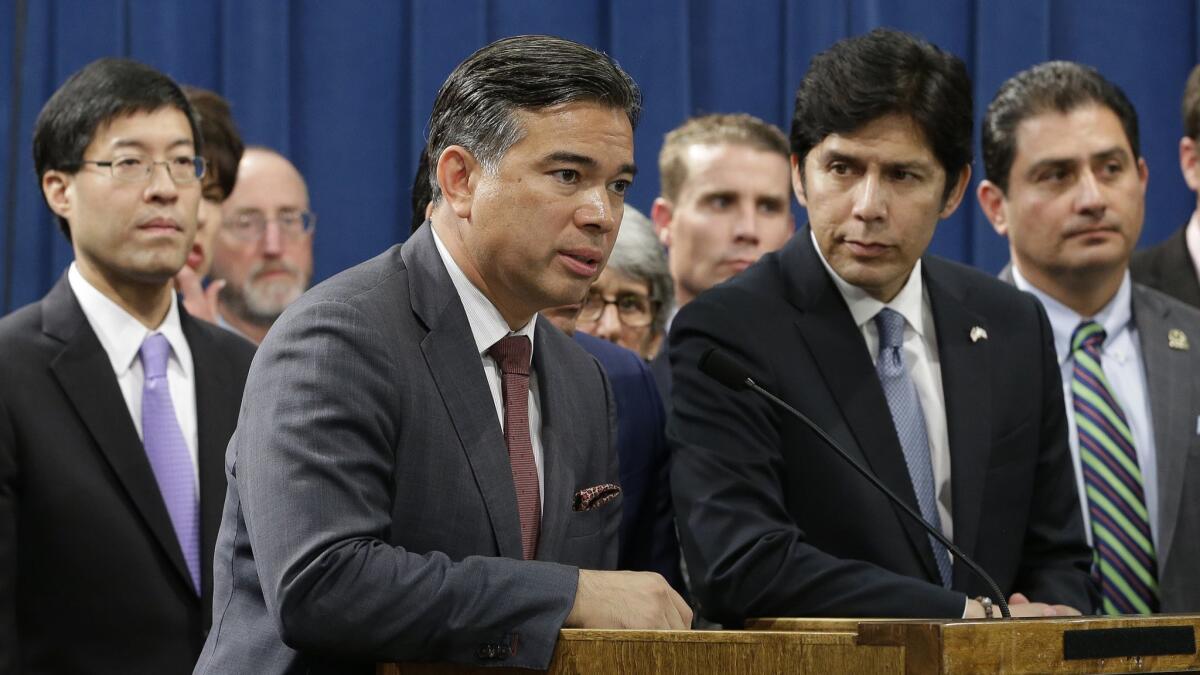California’s new ‘sanctuary’ battle could be keeping immigrant data away from ICE

Reporting from Sacramento — After California’s landmark “sanctuary state” law limited police from collaborating with federal immigration agents, one legislator wants to prevent local government from doing business with companies that he says play a role in the Trump administration’s “deportation machine.”
Legislation introduced Friday by Assemblyman Rob Bonta (D-Alameda) would prohibit cities and counties across the state from entering into new contracts with any company that sells, mines or analyzes personal information for U.S. Immigration and Customs Enforcement or U.S. Customs and Border Protection.
Bonta said he plans to expand the bill to include all federal immigration agencies and move to bar the state from signing contracts with companies that do business with them. But he argues the proposal will still be narrow enough in scope to prevent only deals with companies that collect data, provide support to immigrant detention facilities or engage in so-called extreme vetting programs, such as enhanced pre-screening or background checks.
“It is a way to put our public dollars where our values are,” Bonta said. “It is a way of putting pressure on vendors. They can decide to change their behavior or lose our business.”
The move could set off another clash with President Trump, who is already battling the state over its immigration policies and this month announced plans to cancel $929 million in grant funds for its high-speed rail project.
Bonta’s legislation follows national protests to defund or abolish ICE, for which momentum began building last summer as the Trump administration sparked outcry over the separations of migrant families at the southern border with Mexico.
Tech companies, including Microsoft and Salesforce, have faced mounting pressure to end their business with federal immigration agencies, and criticism over contracts that provide data processing powered by artificial intelligence, facial recognition technology and software to scrub data across social media platforms.
California becomes ‘sanctuary state’ in rebuke of Trump immigration policy »
Assembly Bill 1332, the Sanctuary State Contracting and Investment Act, would prevent cities and counties from signing new contracts, extending old ones or investing in the stocks, bonds or securities of companies that work with federal immigration agencies. It tasks the California Department of Justice with investigating violations, each of which could carry a civil penalty of up to $5,000.
Some companies are unlikely to be affected because the legislation would allow waivers for local jurisdictions when there is no viable alternative to contracting with another business. That could include Microsoft, which dominates the market in providing city and county offices with computers and software, and Thomson-Reuters Westlaw, which provides research services for legal teams.
But among the corporations that privacy advocates say is unlikely to qualify for an exemption is Vigilant Solutions, which granted ICE access to its national license plate reader database, according to a public contract. Law enforcement agencies that serve as its clients have since been flooded with what the company called an “onslaught” of information requests from privacy groups.

A fight simmers in the Bay Area over protecting the privacy of immigrants here illegally »
Another possible target is Silicon Valley’s Palantir Technologies, which as of last year had one of ICE’s most valuable contracts, according to federal spending reports. Among the services it has provided the agency is an “investigative case management” system that allows agents to search a person’s personal connections, addresses, schools attended, immigration history, biometric traits and criminal records, among other data.
Palantir also holds contracts with law enforcement agencies and has helped launch a homelessness initiative in Santa Clara County, a tech platform that mines court, shelter and medical records so that social services providers can identify people to help.
Lawmakers first started looking for ways to limit collaboration between state and local government and federal immigration agencies soon after Trump took office. Some city leaders and privacy advocates warned that the president’s efforts to increase deportations and vetting initiatives would target Muslim Americans and affect immigrants in the country illegally who pose no threat to the public.
As Trump and his wall push Mexico away, California aims to pull it closer »
Others worried the sensitive government data of targeted groups could flow into the hands of federal immigration agencies.
California’s sanctuary state law, which went into effect last year, limits state and local law enforcement agencies from holding, questioning or sharing information about people with federal immigration agents. Other state laws have limited law enforcement from sharing gang database information and prevented local government agencies from turning over sensitive data to immigration authorities without a criminal warrant.
Bonta’s proposal builds on those laws and is based on a local ordinance adopted in Richmond. It was also inspired by Bay Area groups that over the last five years have worked on local policies to limit police surveillance and pushed back against law enforcement’s use of new technology that can sweep up the personal information of all people, regardless of whether they are criminal suspects.
Opponents say AB 1332 would be burdensome on cities and counties and harmful to investigations, including in smuggling and human trafficking cases.
In Berkeley, City Council members are weighing whether to adopt a similar local ordinance, and some warn it could be costly. City Manager Dee Williams-Ridley has written a memo saying the loss of certain data brokers could “impede officers from entering police reports” and hinder the city’s ability to perform legal research and audits and administer other programs.
Surveillance bill could push other cities and counties to follow Oakland police tech policies »
But the #DeportIce coalition, a group of of 50 nonprofits including the American Civil Liberties Union of California and Oakland and Bay Area privacy groups, says cities and counties must shut off the “data pipes” to federal immigration agencies. Three cities have already rejected or tabled contracts — worth a total of at least $3 million — with Vigilant over similar concerns.
“We are not trying to put people out of business,” said Brian Hofer, co-founder of the coalition and chairman of the Oakland Privacy Advisory Commission. “We are trying to get businesses to change their practices.”
In Southern California, civil rights groups are calling attention to cases in which federal immigration agents might have been able to locate immigrants in the country illegally by searching a state government driver’s license database, even though they had no criminal history.
Assemblywoman Lorena Gonzalez (D-San Diego) said she is working with Atty. Gen. Xavier Becerra and Gov. Gavin Newsom to examine the cases and determine whether federal immigration agents possibly skirted California’s sanctuary laws. Finding ways to strengthen or build on state rules to protect immigrant data and limit government’s role in deportations, such as Bonta’s proposal, will continue to be a priority, she said.
“ICE is operating from direction of this president,” she said. “The more protections we can put for law-abiding immigrants to keep their information out of ICE’s hands, the better.”
Twitter: @jazmineulloa
More to Read
Get the L.A. Times Politics newsletter
Deeply reported insights into legislation, politics and policy from Sacramento, Washington and beyond. In your inbox three times per week.
You may occasionally receive promotional content from the Los Angeles Times.











